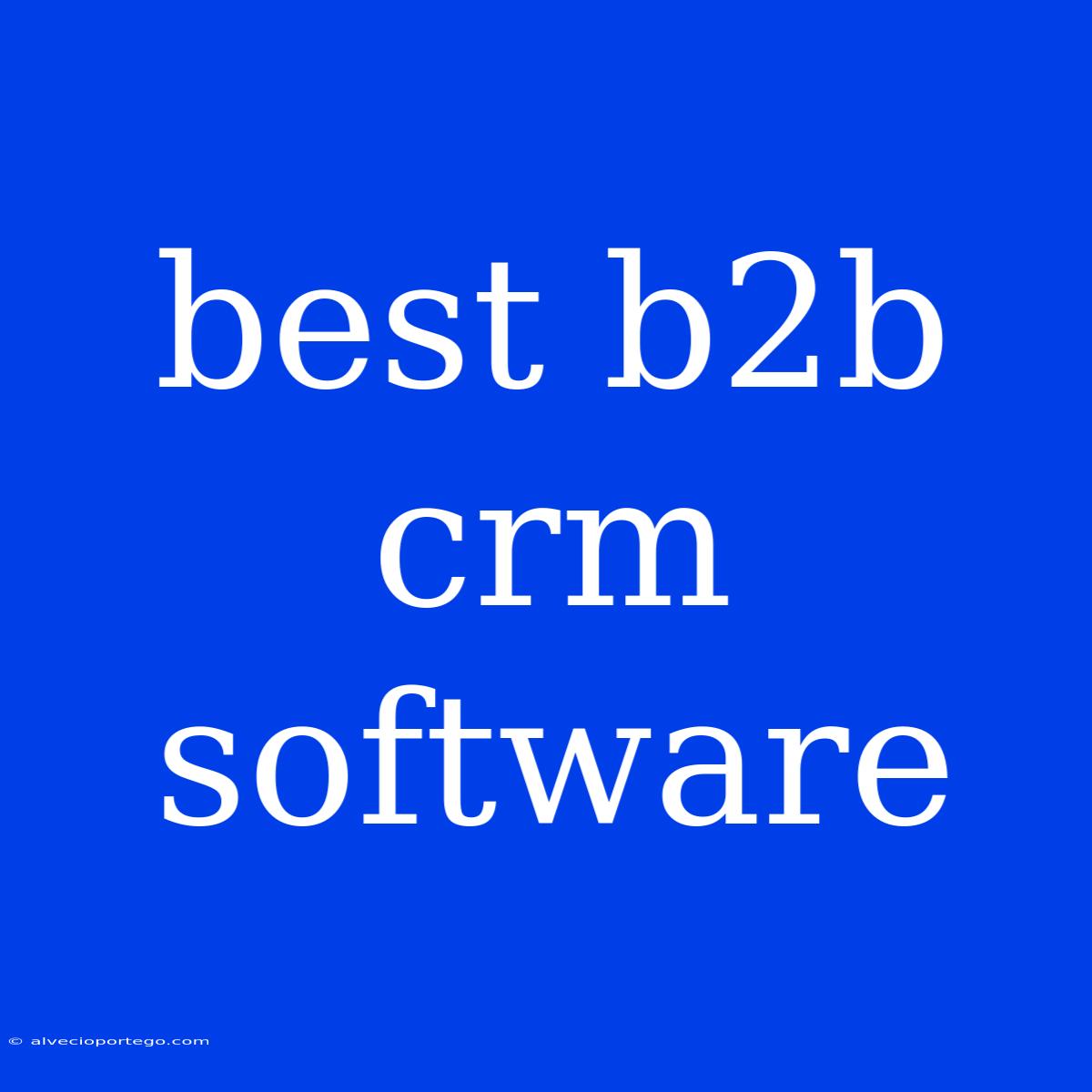Best B2B CRM Software in 2023: A Comprehensive Guide
In today's competitive business landscape, having a robust Customer Relationship Management (CRM) system is no longer a luxury but a necessity. For B2B companies, choosing the right CRM software can be the difference between achieving sales targets and falling behind. With countless options available, it can be overwhelming to navigate the market.
This guide aims to help you find the best B2B CRM software for your specific needs. We'll explore key features, pricing, and popular choices, empowering you to make an informed decision.
What to Look for in a B2B CRM Software
Before diving into specific software, it's essential to understand the key features to consider:
- Contact Management: A core CRM functionality, allowing you to store, organize, and manage contact details, company information, and communication history.
- Sales Pipeline Management: Visualize your sales process, track leads, opportunities, and deals throughout the sales funnel.
- Marketing Automation: Automate marketing campaigns, personalize email sequences, nurture leads, and track results.
- Reporting and Analytics: Gain insights into your sales performance, customer behavior, and marketing campaign effectiveness.
- Integration with Other Tools: Seamlessly integrate with other business applications like email marketing platforms, accounting software, and social media tools.
- Mobile Accessibility: Access CRM functionalities from your mobile device for on-the-go management.
- Customer Support: Reliable customer support is crucial for troubleshooting, training, and getting the most out of your CRM system.
Top B2B CRM Software Solutions:
Here are some of the top-rated B2B CRM software solutions:
1. HubSpot:
Pros:
- All-in-one platform: Offers a comprehensive suite of tools for marketing, sales, and customer service.
- Free plan: Offers a free version for smaller businesses to get started.
- Easy to use: User-friendly interface and extensive resources for learning.
Cons:
- Limited customization: Offers fewer customization options compared to some other CRMs.
- Higher pricing for advanced features: More expensive for larger businesses with complex needs.
2. Salesforce:
Pros:
- Industry leader: Extensive experience in the CRM market and a wide range of features.
- Customization: Highly customizable platform that adapts to specific business requirements.
- Scalability: Handles growing businesses and complex data needs.
Cons:
- Steep learning curve: May be overwhelming for beginners.
- High price point: Can be expensive, particularly for smaller companies.
3. Zoho CRM:
Pros:
- Affordable: Offers competitive pricing plans compared to competitors.
- Wide range of features: Offers a comprehensive feature set for both small and large businesses.
- Integration with other Zoho products: Seamless integration with other Zoho apps, such as Zoho Mail and Zoho Projects.
Cons:
- Limited customization: Offers fewer customization options than Salesforce.
- Can feel cluttered: May seem overwhelming with its extensive features.
4. Microsoft Dynamics 365:
Pros:
- Integration with Microsoft products: Seamless integration with other Microsoft products like Office 365.
- Powerful analytics: Offers advanced data analysis capabilities for gaining insights.
- Excellent customer support: Provides comprehensive training and support resources.
Cons:
- Expensive: High pricing compared to other CRMs.
- Can be complex: May require technical expertise to fully utilize all features.
5. Pipedrive:
Pros:
- Sales-focused: Specifically designed to streamline sales processes.
- Simple and intuitive: User-friendly interface and easy to learn.
- Visual pipeline: Provides a clear visual representation of your sales pipeline.
Cons:
- Limited features: Offers fewer features compared to other all-in-one CRMs.
- Limited automation capabilities: Provides less automation than other platforms.
6. Insightly:
Pros:
- Project management: Offers features for managing projects and tasks.
- Affordable: Offers competitive pricing for small and medium businesses.
- Easy integration: Integrates with popular tools like Google Apps and Dropbox.
Cons:
- Limited analytics: Provides fewer analytics capabilities than other CRMs.
- Mobile app could be better: The mobile app may not offer all features available on the desktop version.
Choosing the Right CRM Software for Your Business
To find the best B2B CRM software for your needs, consider the following:
- Your Business Size and Needs: Evaluate the number of users, complexity of your sales processes, and level of automation required.
- Budget: Determine your budget and explore different pricing plans offered by various CRM providers.
- Features: Identify the most important features for your business, such as contact management, sales pipeline management, marketing automation, and integration capabilities.
- User-Friendliness: Choose a CRM that is easy to learn and use for your team.
By carefully considering these factors, you can select a B2B CRM software that optimizes your sales processes, strengthens customer relationships, and drives your business growth.

